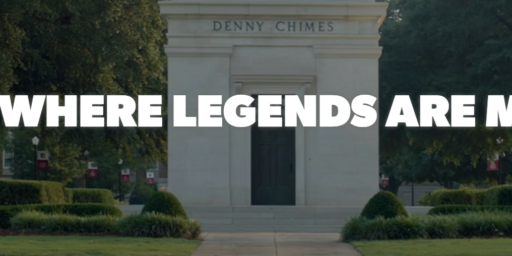For-Profit Universities
For-profit universities are defrauding their students. Indeed, it's their business model.
Inside Higher Ed and others have been focusing a lot lately on for-profit universities, which many in the traditional higher education sector think are little more than degree mills. This has been somewhat vindicated by a recent GAO study finding all manner of shady practices:
Undercover tests at 15 for-profit colleges found that 4 colleges encouraged fraudulent practices and that all 15 made deceptive or otherwise questionable statements to GAO’s undercover applicants. Four undercover applicants were encouraged by college personnel to falsify their financial aid forms to qualify for federal aid–for example, one admissions representative told an applicant to fraudulently remove $250,000 in savings. Other college representatives exaggerated undercover applicants’ potential salary after graduation and failed to provide clear information about the college’s program duration, costs, or graduation rate despite federal regulations requiring them to do so. For example, staff commonly told GAO’s applicants they would attend classes for 12 months a year, but stated the annual cost of attendance for 9 months of classes, misleading applicants about the total cost of tuition. Admissions staff used other deceptive practices, such as pressuring applicants to sign a contract for enrollment before allowing them to speak to a financial advisor about program cost and financing options. However, in some instances, undercover applicants were provided accurate and helpful information by college personnel, such as not to borrow more money than necessary. In addition, GAO’s four fictitious prospective students received numerous, repetitive calls from for-profit colleges attempting to recruit the students when they registered with Web sites designed to link for-profit colleges with prospective students. Once registered, GAO’s prospective students began receiving calls within 5 minutes. One fictitious prospective student received more than 180 phone calls in a month. Calls were received at all hours of the day, as late as 11 p.m. To see video clips of undercover applications and to hear voicemail messages from for-profit college recruiters, see http://www.gao.gov/products/GAO-10-948T. Programs at the for-profit colleges GAO tested cost substantially more for associate’s degrees and certificates than comparable degrees and certificates at public colleges nearby. A student interested in a massage therapy certificate costing $14,000 at a for-profit college was told that the program was a good value. However the same certificate from a local community college cost $520. Costs at private nonprofit colleges were more comparable when similar degrees were offered.
And, yes, the usual suspects were named:
Many of the largest for-profit entities were named among the 15 sites targeted by GAO investigators: University of Phoenix, with more than 400,000 students; Argosy University, part of the 136,000-student Education Management Corp.; Kaplan College, part of the 119,000-student Kaplan Higher Education operation owned by The Washington Post Co.; and Everest College, part of the 110,000-student Corinthian Colleges.
Also named: Westech College in California, Bennett Career Institute and Potomac College in the District, MedVance Institute in Florida, College of Office Technology in Illinois, Anthem Institute in Pennsylvania, and Westwood College and ATI Career Training in Texas. Kaplan, Everest and Phoenix each were cited twice, for different campuses.
Four of the colleges — Westech, MedVance, Anthem and Westwood — “encouraged fraudulent practices” in meetings with undercover investigators, the report says. All 15 “made deceptive or otherwise questionable statements.”
Jennifer Epstein wonders if anything will change:
[Barmak Nassirian, associate executive director of the American Association of Collegiate Registrars and Admissions Officers] said he is doubtful that for-profit colleges will make any large-scale effort to change. “If they really wanted to seriously enforce any kind of a code of ethics, the whole business model would be upended because the business model here is consumer fraud,” he said. “The margins involved can only be produced if you can shortchange people on the substance of what you purportedly sell, which is education.”
GW’s Margaret Soltan adds:
In other words, if they stop lying to hoards of clueless applicants in order to get them to enroll in their school — at which point investors and management at the schools enrich themselves via the federal education loans that attach to said people — if they stop doing this, their very industry collapses. I’ve just described, as Nassirian says, the for-profit business model.
[…]
UD’s been covering the industry for years and she can’t tell you how much of this crap she’s read. Ooh that elitist Harvard with its elitist president — whose salary, around $800,000, compares curiously with the typical salaries of her for-profit peers — from five to ten million dollars a year…
Well, profit is right there in the name! But, aside from the disparity in tuition costs and pressure tactics, I’m not so sure there’s anything surprising here.
In particular, I’m dubious of Nassirian’s premise that these people are purportedly selling education. Instead, they’re rather clearly selling credentials.
Nobody’s turning down an offer to attend Harvard to matriculate at the University of Phoenix. Students are paying a premium for coursework at these schools either because they can’t get in to a real school or because they can’t fit an education around their employment. So, they’re willing to pay for a diploma that provides the key to a better career path.
And, as I’ve noted on more than one occasion, there are enough of these degrees out there that we’re not far from the day when the people doing the hiring themselves have degree mill diplomas. Certainly, they’re not going to privilege those who went to legitimate institutions. Indeed, they might do just the opposite, preferring to surround themselves with people who won’t question their credentials.







I think there’s a better story today:
http://abcnews.go.com/Technology/AheadoftheCurve/techbytes-online-education-college/story?id=11355433
Bill is actually more optimistic than I, but I see the hurdles as social rather than technological. Perhaps Bill has a pulse on education hackers and social changes in the wings.
BTW, I think the missing angle on the original reports was on how affordability-as-loans has crippled US education’s evolution.
Most of those scams were about getting the government money, as loans. If the government had been after affordability-as-low-tuition we’d probably be a heck of a lot further down the road to Gates’ vision.
Let’s not have the illusion here that traditional universities aren’t also in the business of selling something and making a profit. As Glenn Reynolds has pointed out in many articles over the past several months, there’s a tremendous disconnect between the cost of a traditional college education and the value that students actually receive for their education.
Once again today, President Obama will be making a speech promoting the idea that going to college is the goal that all students should be shooting for, and in doing so he’s essentially giving free advertising, and a nice endorsement, to traditional universities. Whether that’s true or not, is another issue entirely.
Let’s also not forget that most boosters of traditional university are also in the affordability-as-loans value network. Why hold down the number of tenured positions, when the students can get a loan?
Most public universities, at least, are sinkholes. Tuition is increasing rapidly because states can’t afford to subsidize them at the current scale.
I think that’s true. Mostly because there’s a disconnect between what higher ed is and what we’re expecting it to do.
It’s problematic, to be sure. The broader we cast this net, the less likely it is to have the desired results, especially for the newly captured students.
Fair point, although the sports powerhouses of the NCAA do seem to make up some of that loss — not that I’m aware of any of those sports profits being recycled back into the schools sufficiently enough to allow tuition costs to stay under control, of course.
A handful of schools make a mint but they tend to recycle it into the athletic program, with just a bit going to academic scholarships and such. Coaches salaries have gone into the stratosphere, of course, but mostly it’s a Title IX thing. Football, and to a lesser extent basketball, subsidizes a huge array of sports no one cares about but are expensive — and mandatory — to provide.
To recap:
– For-profit institutions are selling services under questionable circumstances and encouraging defrauding the systems in place to provide loans to those looking to go to college. Some traditional universities are selling services under questionable circumstances (c.f. major public and private institutions) but typically not defrauding the loan system. And other traditional colleges and universities are selling services under largely transparent circumstances (c.f. community colleges) while also not defrauding the loan system.
– The country’s hiring and pay structures continue to tout a college education as necessary for almost all jobs, even those for which a college education is clearly not required. Meanwhile, jobs which clearly require intellectual engagement and advanced training are being taken up by those who can obtain higher degrees, making the standard college education merely an indicator of mediocrity for most who get it, regardless of their actual abilities.
– College athletics, rather than academic capacity of graduating students, appears to be a motivating factor for the continued success of many schools. As a consequence, these schools reward those involved with academics (students and coaches) while seeing the benefits of increased enrollment from name recognition. In essence, sports = advertising = more money all around, or, by contrapositive, no sports = limited advertising = less money all around.
For some reason, none of this makes me feel like our higher ed system is working right now. (So that at least makes it similar to our lower ed system — it’s good to have continuity in life.)
ptfe, there were some scandals a few years ago, when (state?) college loan officers were found to be accepting gifts (vacations, iirc) for placing students with certain loan providers.
I think the gray zone is very wide on this. The state and federal loan systems incentivize a lot of behavior that is not in student interest. Yes, some at non-profit colleges was found to be actually illegal, but a lot more is just morally suspect.
I guess I’m ‘simple’ in the sense that I’d prefer subsidized eduction to be overt, at the front end, in reducing tuition costs. If the country can’t afford as many students that way, then we probably can’t afford them. Right now it is just hidden, out there with the ranks of un- and under- employed ex-students (not all ‘graduates’) carrying huge loan balances.
I agree with Dough. I think a lot of non profit colleges and universities are just as much into selling the credential as actual education. I also think a lot of colleges and universities are prone to encouraging students to take on too much debt.
I suspect that the nature of higher education and the demands of future employers is going to change before too long. I think for too many years the college degree has been sold as a ticket to high earnings when that is only the case in some areas of education. At some point this bubble is going to pop because a 20k a year job isn’t going to help pay off 80k or more in loans.
The bubble is popping. Here is the website of a recent law school victim who had started hunger strike to bring light to the terrible lies and treatment by law schools to their “students”. Can we not expect to see other protests regarding other university systems now that their victims are another day older and deeper in debt and their “skills” are proving to be of little demand.
I know James believes a university education is more to broaden horizons, expand knowledge and provide a few tools that will be useful in later life. Unfortunately, the schools (for-profit, private and public) sell their programs as vocational training that will convert into a good job. They have to sell the job training, otherwise, it would be unwise to go deeply in debt to just become better educated with little prospect for a well paying job. Or as Will Hunting put it:
The traditional value of universities to bring together diverse minds in an environment where day to day problems are not foremost to facilitate a melding so to speak has been diluted by the internet, general improvement of living standards and aggressive action against non-pc thoughts and ideas. So they sell job training only the jobs aren’t materializing. Which is ironic since the universities are hotbeds of opinion and action demonizing those who would provide those jobs.
How dare you question the profit motive. We are going to have to do something about all you damned Marxists…
The incredible cynicism of these diploma mills is that they ignore most of the historical reasons for higher education – to impart basic knowledge while reinforcing the existing class structure. While you get your occasional Barack Obama who sneaks into Harvard and studies his hindquarters off, the far more common story is that the attendees of our “Grandes Ecoles” are from considerable wealth already. And around 50% of our nation’s medical students are from families including at least one doctor – and that’s probably not because excellence in math and science is quite so hereditary. These institutions have an additional unspoken benefit of social “stability.” How funny that Americans have taken such pains to forget that a generation or so ago, these very schools were quite reticent to accept women, Jews, Catholics, anybody with skintone darker than Irish, etc. Today, we’ve come to accept the narrative that education has always been about the pure absorption of knowledge, because it’s not like we have a caste system or anything like that.
Then again, this is too complex – these diploma mills are selling career aspirations to people through pure indebtedness. If we stop allowing people to become debt-serfs, the problem will right itself.
I do think there is probably something to the point that college at one time was pretty much limited to those in the upper classes, mostly because of affordability and in general the nature of the economy as well (what would be the point of college when you could finish high school and get a very good paying job at a factory).
I think the GI bill did a lot to change who went to college. I know for a fact my father likely would not have gone to college had there not been a GI bill to help pay for it. But now I do often wonder if we haven’t pushed college to the point that we encourage people to take on loans to get a degree when they may not in reality be able to graduate. The only thing worse than graduating with 80k in loans would be failing to graduate with 40 or 50k in loans.
I wonder if it might not be better to move some degrees out of college that really should be more along the lines of a two year technical program. I really don’t see the reasoning behind a 4 year degree for some majors. I also believe that we should value apprenticeship and on the job training programs that come with licensure and credentials as enough.
I think you are expecting less reinvention than we might have, Just Me.
Bill Gates (a moderately successful drop-out) echoes my comments from last year, that while people can often learn on-line, there isn’t a good certification system in place. We in comp-sci can show by doing. Learn database management, and then set up a live demo as resume. To show you can do a phone app it’s even easier, phone app as resume.
I’ve heard of electrical engineers making business cards which are working circuits.
I suppose there are self-educated journalists who have demonstrated their skills with blogs.
The reinvention of education will come when we figure out how to test and certify less easily demonstrated knowledge. Then the price will drop out, and universities will no longer be able to play the affordablility-as-loans game.
Reading this article and the attached comments, you’d think that all one has to do to get a degree from a for-profit institution is pay the money and, presto!, here’s a degree. Sorry to say folks, it’s not that easy. I graduated from the University of Phoenix MBA program and it was no cake walk. It took six hard years of work to earn my degree. I completed the program at my own pace with plenty of encouragement from friends, family, and my academic counselor. I was never mislead or encouraged to provide fraudulent information on any form I filled out. My employer, a major Fortune 500 company, promoted me based on the completion of the program. I earn a six figure compensation for my work and I am proud to say I am a graduate of the University of Phoenix.
I’ve worked in higher education for nearly ten years, and know that “for profit university” and “degree mill” are not synonyms. Many for profit institutions are expensive and academically unremarkable, but the big name ones that everyone loves to hate are all accredited by accreditation organizations consisting of their peers — including those from non-profit and public colleges and universities. If people want to find fault with for-profit schools it’s hardly difficult, but “degree mill” actually means something specific, and I wish people would be more careful not to throw the term around in a misleading fashion.